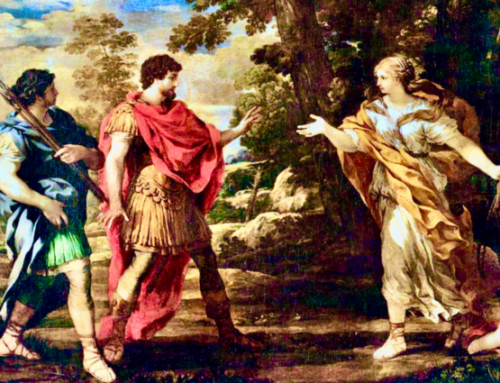Author’s Introduction: Imagine if Homer, Virgil, Dante, Chaucer, and the other great poets of ancient Greece, Rome, and the Middle Ages had been given the gift, not only to peer into the twenty-first century, but to correspond with us who live in that most confusing and rudderless of centuries. Had it been in their power to do both of those things, what might they say to us? How would they advise us to live our lives? What wisdom from their experience and from their timeless poems might they choose to pass down to us?
Homer: On War
The years have not changed you, my fellow mortals. Still you rage and go to war. Still you fall upon each other, driven by pride and greed and the desire to conquer the earth. I can still see it in you: the wrath of Achilles, the arrogance of Agamemnon, the craftiness of Odysseus.
No, you have not changed… and yet you have. You have lost something, or, rather, you have lost two things. Even as you have surrendered the glory of war, you have ceased to understand its horror.
You seem to think that the only thing that makes war calamitous is that it causes death. Did you think that without war you would live forever? Even long-lived Nestor succumbed to death, and, with him, aged Priam. There is no escape from our mortality, only a prolonging of our brief and bitter years.
Death is not the chief horror of war, though it is a melancholy thing to see young men torn down in their prime of life. Far worse are the cries of those left behind: Priam bereft of his many sons; Andromache torn from her beloved Hector; Achilles separated from the friend of his heart. Even the powerless captive Briseis weeps bitter tears for Achilles’ friend, for Patroclus was kind to her and had promised to secure her marriage to Achilles. These are the true casualties of war, the widows and orphans, the childless parents, the friendless grievers, and the siblings left stranded and alone.
War does terrible things to our bodies, but worse things to our souls. It makes enemies of those who should be friends. How Achilles and Hector would have enjoyed each other’s company! How they would have inspired each other to great deeds and noble enterprises! Those who kill and are killed on the battlefield share more in common with each other than they do with the civilians they left behind.
War is a fever that cannot burn purely for long. Eventually, it consumes its own virtues, its own sense of right and wrong. Let it burn for years on end, and it will tear down civilization itself. It cannot sustain its dignity when it is overwhelmed by brutality. As water weathers the thickest stones, so ten years of war dissolves those subtle ties that make us human, reducing us to the amoral status of the lion and the wolf.
Choose life, you children of the latter days: not because you fear pain or destruction or death, but because you value peace and harmony and the fruits of the good life. The choice stands ever before you, even as it was engraved on the glorious shield of Achilles. Let the wise among you who have grown old in the wisdom of experience mediate your disputes. Forsake treachery and the allure of easy gain. Celebrate your rituals, your births and marriages and days of harvest. Let your lives be marked by them, and not by the battles you wage.
*****
And yet, that is not the whole story. Your obsession with death blinds you to the true horrors of war. But it blinds you even more to those aspects of it that are good and noble and beautiful.
The ugliness of war is matched only by its magnificence. War presses man to his breaking point, and, in doing so, reveals his glory. Hemmed in on every side, the soldier rises above his limits and asserts his divinity.
There is not only great courage in the life of the soldier; there is great joy as well. War allows him to exercise his courage in an appropriate arena: on that horrible-beautiful battlefield where men win glory. Only there does he feel the full strength in his arm, the full breath in his lung, the full laughter on his lips.
Whether he charges forward heedless of his own death or stands firm at his post in the face of impending attack, he consummates the full measure of his courage and proves to himself and his comrades-in-arms that he is a man who has overcome all fear. This may lead to his death, but, if it does, he goes to that death in a state of total life.
He may have gone to war to win prizes, but he forgets those prizes when the spirit of battle has taken him up in its arms. At that moment, there is only himself and the enemy. He does not hate the enemy, though he knows he must defeat him. If his enemy is worthy, he will not consider it a shameful thing to be killed by his sword.
In such moments, he is free from madness and despair. He is one with his sword, one with his battle prowess, one with the cause that has taken him on to the field. His war cry then is a pure sound of rapture. Time and space collapse around him, and he glimpses an eternity of which even the gods are ignorant.
Oh, to see his helmet glint in the sun and to feel the earth tremble beneath his swift, unerring feet. That was my Achilles before his heart was broken and wrath consumed his joy. Before Agamemnon stole his prize and Hector slew his friend, he released more men for ransom than he killed.
But your age has no Achilles; you know neither his ecstatic delight in battle nor his destructive wrath against the horrors of war. You fight without joy and protest without knowledge. You do not see that war is as much a part of the human condition as it is a part of the human spirit.
Listen to the old soldiers, to the Nestors in your midst, who can tell you tales of how they met themselves for the first time upon the field of battle. Do not go in search of war, but when it finds you, take it up as you would any challenge that promises to test the limits of your skill, your endurance, and your virtue.
Sound the war cry and be of good cheer.
—Homer
The Imaginative Conservative applies the principle of appreciation to the discussion of culture and politics—we approach dialogue with magnanimity rather than with mere civility. Will you help us remain a refreshing oasis in the increasingly contentious arena of modern discourse? Please consider donating now.
The featured image is “The Procession of the Trojan Horse in Troy,” by Giovanni Domenico Tiepolo, courtesy of Wikimedia Commons.








Several years ago, I attended a conference at which three classical educators held a Q&A, not as themselves but as Augustine, Athanasius, and Aquinas. It was masterfully done. This piece rivals that event, and more, I can share it. Thank you.